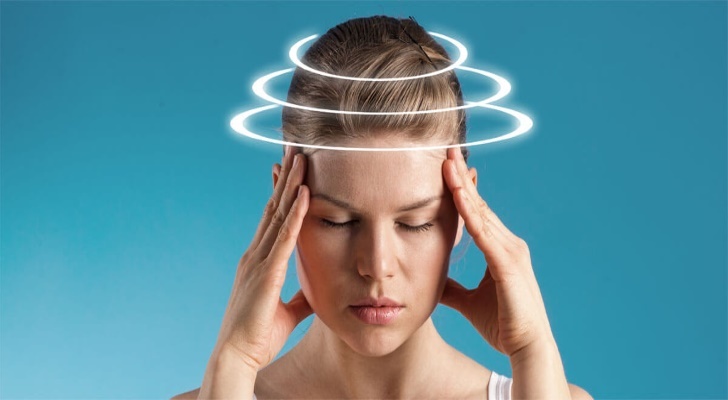Vertigo Symptoms and Signs

Loss of balance. Difficulty in balancing, or an inability to walk in a normal manner are both common signs of vertigo. Alternately, a patient may simply complain of feeling that they just cannot maintain their balance. Imagine a straight line drawn on the floor, and yourself trying to walk along that line, placing one step after another. A person suffering from vertigo would be unable to keep on the line no matter what they did.

A severe pain in the head. Migraines are actually closely related to feelings of vertigo, but did you know that people who suffer from migraines can also feel vertigo even if they aren’t at that moment feeling a headache? A migraine itself can directly cause a person to feel dizzy and not very steady on their feet. This condition is caused by changes in the flow of blood within the vestibular region, as well as alterations in nerve responses in the same area. People who suffer from vertigo are often subject to the same causative factors as those who suffer from migraines.

Queasiness and feeling like throwing up. It is well known that nausea is a related symptom to vertigo, and it is one that people find very difficult to deal with. Not only does food intake fall considerably, but one’s lifestyle can also be severely affected, as simply seeing a moving object or looking at a computer screen could trigger the feeling. Oddly enough, some old remedies do seem to help, such as, for example, peppermint tea. While these can help alleviate the condition to some extent, there are also some highly effective prescription drugs that combat nausea on the market today.

Hearing a buzzing, or other odd noises in the ear. People who suffer from vertigo also often hear a strange buzzing or whirring noise in the ear. Depending on what is causing the symptoms, this noise can vary. Some people hear a hissing noise that is continuous, whereas other people hear a flutter or a click, or even a whistle. The pitch experienced can be high or low and the noise can vary in frequency or sometimes even be continuous. It is exceedingly difficult to deal with and can be very distracting from the activities of everyday life. It is not a symptom to be ignored as it is associated with a loss of hearing.

Simple dizziness. Children tend to whirl themselves around to feel dizzy, and while this might be interesting to a child; it is hardly amusing to an adult. It can be especially difficult if you are trying to get to work and feel an extreme dizziness coming on. Of course, there are a lot of easily available medications to counter this, but if the feeling persists for any length of time, or if it is accompanied by other symptoms of vertigo, such as an odd whirring in the ears, you should consult a doctor.

Profuse sweating. Heavy episodes of sweating are definitely connected with vertigo, and actually, accompany episodes in which you are extremely unsteady on your feet. When sweating is caused by vertigo, it will be concentrated in the upper body. The forehead will not only sweat profusely but will also feel clammy and cold. The neck will also experience similarly profuse sweating, accompanied by a chill, and so will the chest. Vertigo is particularly associated with these damp chills, and if you experience this, you need medical attention.

A tic in the eye. Vertigo is often caused by a buildup of fluid in the ear, and this can cause a host of other symptoms. This is because the ear, nose and throat are rather closely interconnected, and what affects one also affects the other areas. You may experience a flutter of the eyelid, or an itch, or even spasms in some muscle of the eye. These may cause you to have an uncontrollable to desire to rub the eyes, but generally speaking, placing a cold compress on the affected eye works much better. However, you may take consolation in the fact that these symptoms will not last long, though of course, your vertigo will still need treatment.

Anxiety attacks. When you are suffering from a condition that causes vertigo, it may be advisable to avoid situations that cause you anxiety. This is because when you are panicked, you tend to hyperventilate, and hyperventilation can very easily bring on effects that are very similar to vertigo, and which will certainly include nausea and a feeling of light-headedness. Oddly enough, sufferers from vertigo tend to suffer from anxiety attacks and also tend to panic easily. The usual anxiety attack might last about half an hour and can be quite traumatizing to one actually experiencing it. The experience has been likened to that of a stroke. When people suffer from anxiety attacks, they tend to reduce interaction with their peers as much as possible, and this can cause them to become quite isolated.

Difficulties with verbal communication. If you suffer from vertigo and are having problems with language, it is an indication that the condition might be quite serious. While vertigo is more usually an indicator of problems with the inner ear, it can also possibly be caused by a condition or an infection that is causing brain damage. If you have problems with speech or in understanding language, and these symptoms are accompanied by vertigo, you would be well advised to see your doctor immediately. This is even more urgent if you have recently suffered a concussion or if you have a serious condition that could lead to brain injury.

Problems with vision. Many people suffer from chronic vertigo also have problems with vision. This is simply because both the ears and the eyes are used to control balance, and when one set of organs is affected, the other tends to try to compensate for this. Thus, as vertigo is usually caused by problems with the inner ear, it means that the inner ear is not contributing to balance. The brain then tries to get more information from the eyes which can cause problems like double vision or jerky movements of the eyes.
